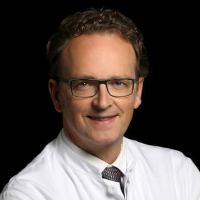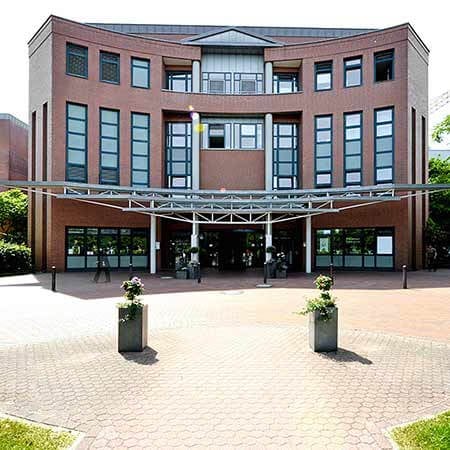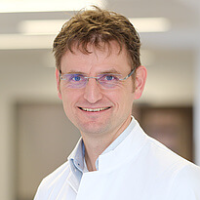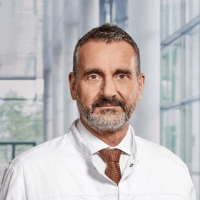Surgical treatment Without the Heart-lung Machine for Congenital and Acquired Heart Defects in Germany
Treatment prices are regulated by national law of the corresponding countries, but can also include additional hospital coefficients. In order to receive the individual cost calculation, please send us the request and medical records.

Department of Cardiothoracic Surgery
According to the Focus magazine, the Department of Cardiothoracic Surgery ranks among the top German medical facilities specializing in the surgical treatment of diseases of the cardiovascular system and lung cancer! The department offers the full range of surgical services for the treatment of diseases of the cardiovascular system, respiratory tract, including heart and lung transplantation, artificial heart implantation. The therapeutic options include aortic surgery, coronary artery bypass grafting, transplantation surgery, surgical treatment of heart rhythm disorders (arrhythmias), minimally invasive surgery, surgical treatment of the heart valves, including reconstructive interventions. All operations are performed using state-of-the-art technology and in accordance with the current recommendations of professional societies.






Department of Cardiac Surgery
The Department of Cardiac Surgery provides a full range of surgical treatment in its area of specialization. Special emphasis is placed on heart valve repair and replacement surgery, coronary artery bypass grafting, thoracic aortic surgery, adult congenital and acquired heart disease surgery, pacemaker and defibrillator implantation, and artificial heart implantation for severe heart failure. Many heart operations are performed using minimally invasive techniques, which has a positive effect on the healing of the surgical wound. Minimally invasive cardiac procedures also reduce surgical risks and contribute to a rapid recovery of the patient in the postoperative period. Surgical treatment of cardiac pathologies is performed in advanced operating rooms equipped with the latest technology. The cardiac surgeons of the department successfully perform routine and complex surgical procedures, saving the lives of thousands of patients. The specialists work in accordance with current clinical protocols and follow the recommendations of the German Society for Thoracic and Cardiovascular Surgery (DGTHG).


Department of Cardiothoracic Surgery and Vascular Surgery
The Department of Cardiothoracic Surgery and Vascular Surgery provides effective surgical treatment for diseases of the heart, respiratory system, and blood vessels. The team of cardiac surgeons operates on patients with heart valve pathologies, coronary heart disease, heart failure, and heart rhythm disturbances. In the field of thoracic surgery, the key focus is on the surgical removal of lung tumors and lung metastases. The specialists in this area also perform surgery to repair chest wall deformities. In the field of vascular surgery, interventions for abdominal and thoracic aortic aneurysms are most often performed here. The department's vascular surgeons are also exceptionally competent in the treatment of peripheral occlusive arterial disease. A great advantage for the department's patients is that almost all surgical interventions are performed using minimally invasive techniques, so there is no need for a long postoperative recovery. The department's operating rooms are equipped with state-of-the-art technology. This allows for effective and safe treatment. The priority is always personalized medical care for patients.






Congenital heart defects are common pathologies among children. Up to 1% of newborns are born with them. Most defects require surgical treatment, and some are repaired as early as the first year of life. Even more often, cardiac surgeons treat acquired heart defects in adult patients. They are associated with damage to the heart valves and usually develop in old age due to degenerative changes in the heart and large blood vessels.
In standard cases, open surgical techniques are used to repair congenital or acquired heart defects. This means that surgery is done through a large incision in the center of the chest using a heart-lung machine. But for many diseases, doctors began to use more sparing methods. Whenever possible, operations can now be performed without a heart-lung machine, without dissection of the sternum, and without opening the heart cavities. The incisions are made between the ribs. Sometimes an incision in the groin or small punctures in the chest wall are sufficient to approach the heart.
You can opt to undergo your treatment in Germany to take advantage of the latest advances in medicine and cardiac surgery. This is a country with top-class medicine that uses cutting-edge techniques in the treatment of heart defects. You can find out the cost of treatment in Germany on the Booking Health website. On our website, you can find the prices for different operations. After choosing the most suitable option, you can immediately make a treatment appointment on your preferred dates.
Content
- What is a heart-lung machine, and when can it not be used for congenital and acquired heart defects?
- Advantages of surgery without a heart-lung machine for congenital and acquired heart defects
- Why to have your surgery without a heart-lung machine in Germany for congenital and acquired heart defects?
What is a heart-lung machine, and when can it not be used for congenital and acquired heart defects?
A heart-lung machine is a device that takes blood from the human body, saturates it with oxygen, and returns it to the body. In fact, it temporarily performs the functions of the heart (pump) and lungs (oxygenator) while a doctor performs the surgery.
The heart-lung machine is required in all cases when cardiac surgeons open the heart cavity. It allows doctors to let blood bypass the heart, stop it, and perform any manipulations. At the same time, there are virtually no time limits because, under the conditions of cardiopulmonary bypass, doctors can operate on a patient for several hours if a clinical case requires it.
However, if possible, doctors tend not to use heart-lung machines because their use may sometimes cause complications. They are not common in Germany because state-of-the-art types of heart-lung machines are used. Nevertheless, this device is not necessary in many cases.
Surgical treatment without the heart-lung machine for congenital and acquired heart defects in Germany is possible in the following cases:
- the heart cavity is not opened;
- a surgical intervention is performed on large blood vessels in the region of the heart;
- the heart is approached from inside the blood vessels (an endovascular technique);
- the heart is approached not through a large incision but through a puncture (a transcatheter technique).
At modern German hospitals, many cardiovascular diseases, including acquired and congenital heart defects, can be treated without a heart-lung machine. For example, such operations can be performed to repair the mitral valve or replace the aortic valve, and treat atrial or ventricular septal defects, coarctation of the aorta, patent ductus arteriosus, or partial anomalous pulmonary venous drainage.
Advantages of surgery without a heart-lung machine for congenital and acquired heart defects
As a rule, operations without a heart-lung machine are less traumatic. Many of these are performed through an incision in the groin or short chest incisions. In addition, the mere fact of avoiding the use of heart-lung machines has advantages because cardiopulmonary bypass may cause complications. They occur due to damage to proteins and blood cells, inflammatory reactions, disturbances in the gas composition of the blood, dilution of the blood, sometimes cooling, and also due to the use of non-pulsatile flow.
The use of the heart-lung machine may cause a systemic inflammatory response, damage to the heart, kidneys, and brain, as well as bleeding and oxygen starvation of various organs.
If it is possible to perform surgery without a heart-lung machine, it is better to perform it on a beating heart. However, this does not mean that the heart-lung machine should be abandoned in all cases without exception. Sometimes, heart defects can only be eliminated with the help of open-heart surgery under the conditions of cardiopulmonary bypass. The heart-lung machine is an important achievement in medicine and cardiac surgery, as its invention has made it possible to achieve outstanding success in the treatment of dozens of deadly cardiovascular diseases. In addition, modern devices available at German hospitals are safer than older models. They maintain the optimal gas composition of the blood and almost never injure the cells. The risk of developing a severe inflammatory reaction after the use of modern heart-lung machines is minimal.
Why to have your surgery without a heart-lung machine in Germany for congenital and acquired heart defects?
Many patients with cardiovascular diseases go to Germany for treatment because this country offers a high level of medicine. The Departments of Cardiac Surgery have state-of-the-art equipment. Treatment in Germany is carried out using the most advanced surgical interventions and minimally invasive procedures that allow for the cure of many congenital and acquired heart defects without a heart-lung machine or even open surgery.
There are a few reasons for you to undergo your treatment in Germany. These are the following:
- the level of medicine is one of the best in the world;
- patients can benefit from advancements in the field of cardiovascular surgery;
- advanced German hospitals use endovascular techniques, thoracoscopic surgery, and robot-assisted heart surgery without heart-lung machines;
- a low risk of complications;
- a low patient mortality rate, even when performing complex operations;
- successful treatment of patients of any age, including children in the first year and first month of life, as well as premature infants with low weight;
- relatively low prices as compared with other countries with advanced medicine.
You are welcome to use the Booking Health website to find out the cost of treatment in Germany or other countries offering top-class medicine, compare prices at different hospitals, and make your treatment appointment at the best price. On our website, you can find the best hospitals in Germany that have outstanding achievements in cardiovascular surgery.
When you make an appointment through the Booking Health service, the cost of treatment in Germany will be lower for you than when you contact the hospital directly. The prices will be reduced due to the lack of high taxes for foreign patients. The original price is final, and it will not increase after the start of the medical care program, even if additional medical services are required, since you will receive insurance.
The Booking Health specialists will arrange your trip to one of the German hospitals specializing in cardiovascular surgery. We will contact the hospital administration, make an appointment on your preferred dates, book the nearest hotel to the hospital, and translate your medical records into German. We will also meet you at the German airport, take you to the hospital, and provide interpreting services. After the completion of your treatment in Germany, we will organize your return transfer from the hospital to the airport. Thanks to the specialists at Booking Health, you will be able to cure a cardiovascular disease in a country with advanced medicine, completely ridding yourself of organizational issues and focusing on restoring your health.
Authors:
The article was edited by medical experts, board-certified doctors Dr. Nadezhda Ivanisova and Dr. Vadim Zhiliuk. For the treatment of the conditions referred to in the article, you must consult a doctor; the information in the article is not intended for self-medication!
Sources:
ECR - European Cardiology Review

